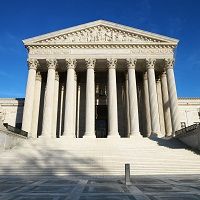Article
Supreme Court Decides to Review ACA Subsidies Case
Author(s):
In a surprising move Friday, the Supreme Court agreed to review a closely watched Appeals Court decision that said the federal government can extend tax credits to federally established health exchanges. If the Supreme Court votes to reverse the lower court's decision, it would effectively spell the end of the Affordable Care Act (ACA).

In a surprising move Friday, the Supreme Court agreed to review a closely watched Appeals Court decision that said the federal government can extend tax credits to federally established health exchanges. If the Supreme Court votes to reverse the lower court’s decision, it would effectively spell the end of the Affordable Care Act (ACA).
In the case in question, King v. Burwell, the United States Court of Appeals for the Fourth Circuit in July of this year ruled that patients are eligible to receive federal subsidies when they purchase health insurance on federally run health exchanges.
The challengers in that case claimed that language in the text of the ACA limited subsidies only to people who purchased insurance through “an exchange established by the state.” According to an article in the New York Times, the Internal Revenue Service issued a regulation “saying subsidies are allowed whether the exchange is run by a state or by the federal government.” When arguing the case, Solicitor General Donald B. Verrilli Jr. said that the challengers’ interpretation was “contrary to the act’s text and structure and would render the act unrecognizable to the Congress that passed it.”
The Fourth Circuit judge presiding over the case agreed that the text of the ACA was “ambiguous and subject to multiple interpretations,” which meant, as per long-standing practice, the interpretation of the agency tasked with administering the statute (in this case, the IRS) should take precedent.
Around that time a 3-judge panel of the United States Court of Appeals for the District of Columbia Circuit ruled in a similar case that the IRS interpretation is incorrect, and that only people purchasing health insurance through state-run exchanges are eligible for federal subsidies. However, that ruling was later vacated by the full District of Columbia Circuit.
Once that happened, ending the split among the federal appeals courts, many observers thought there was little chance that the Supreme Court would agree to review one of the cases. Now, oral arguments for the review will be held sometime next year, with a ruling expected in June.
This turn of events does not bode well for the ACA. Writing in the SCOTUSblog, Nicholas Bagley thinks the decision to review means “that four justices apparently think—or at least are inclined to think—that King was wrongly decided.” He noted that “the justices’ votes on whether to grant the case are decent proxies for how they’ll decide the case. The justices who agree with King wouldn’t vote to grant. They would instead want to signal to their colleagues that, in their view, the IRS rule ought to be upheld. The justices who disagree with King would want to signal the opposite.”
Should the Court break along the same lines as in 2012, when Justices Alito, Scalia, Thomas, and Kennedy were willing to strike down the ACA, and Justices Kagan, Sotomayor, Breyer, and Ginsberg wanted to preserve it, Chief Justice John Roberts will once again hold the ACA’s fate in his hands, along with the fates of millions of Americans who are currently receiving subsidized health insurance through a federal exchange.




